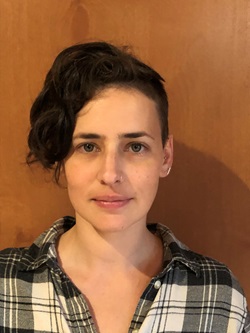11/30/2023
Kibbutz Attack Survivor Speaks at Federation Women IN Philanthropy MaIN Event
- Share This Story

Flash
COURTNEY BRYNES | CJN
Article reprinted with permission from Cleveland Jewish News
After her community of Kfar Aza kibbutz in Israel was attacked on Oct. 7, survivor Keren Flash has been sharing her story to shed light on the murdered, kidnapped and displaced.
Flash traveled to Cleveland for a couple days to join in a conversation with Danyelle Neuman, chief of sales strategy for The Jewish Agency for Israel, at the Jewish Federation of Cleveland’s Women IN Philanthropy MaIN Event Nov. 29 benefiting the annual Campaign for Jewish Needs and Israel Emergency Fund. Flash and Neuman spoke with the Cleveland Jewish News prior to the event on Nov. 28.
“We can’t stay silent and we can’t let this nonsense that’s going on in the world to continue,” Flash told the CJN. “Because it’s unbelievable that having lived through the horror and the terror of Oct. 7, we still have to justify existing as a people.”

Neuman
Born and raised in the Gaza envelope in the southern district of Israel, Flash lived in Kfar Aza with her husband, Avidor Schwartzman and their 1-year-old daughter Sa’ar. Her parents, St. Paul, Minn.-native Cindy and Israeli-born Igal, also lived in the kibbutz but were killed in their safe room on Oct. 7.
While Flash and her family first went into their safe room around 6:30 a.m., they only began to evacuate around 11:30 p.m., while under fire. They finally left the kibbutz at 2:30 a.m. Oct. 8.
She called the kibbutz community, her parents included, the “salt of the earth” as many have lived there for generations, helping found the state of Israel. A kibbutz she described as a community like no other where there’s safety and security in the close-knit community.
“Everyone takes care of their small piece of land together. You help people who can’t or won’t, and there’s a balancing between the people there,” Flash said. “They’re the first people to jump against corruption if it happens and protest for those who can’t protest for themselves, for Palestinian rights, for Bedouin rights, for Ethiopians, for basically anyone who’s considered oppressed.”
As she distinguishes Hamas from the Palestinian people, Flash views a future where the Israeli and Palestinian people can coexist. She said the hostages must be brought back home and Hamas must be eradicated from Gaza.
Keren Flash’s home in Kfar Aza. Submitted photo
“When I speak of Hamas, I’m talking about a cancer in Gaza that took over everything and refuses to let go, and I want to save the patient,” she said. “Let’s save the Palestinian people and the Israeli people. No one’s going anywhere and the only way to keep living there peacefully and not having this happen again and again is to try to coexist. Its the only way.”
Kfar Aza was home to about 800 people prior to Oct. 7 and one in 10 residents were either killed or kidnapped, she said. In Nir Oz, a kibbutz of 400, 180 were killed or kidnapped. 130 of Kibbutz Be’eri’s 1,200 residents were also killed in the attack, with 50 taken hostage.
“There’s a reason they attacked Kfar Aza and Be’eri, they’re two different municipalities and they’re the strongest kibbutz,” Flash said.
Flash and other survivors have been staying at Shefayim and receiving support from The Jewish Agency, which had convened an emergency response team by 9 a.m. on Oct. 7 as the country became aware that something of a different magnitude was happening. There are now about 200,000 internally displaced people in Israel.
Keren Flash’s parents, Cindy and Igal, who were killed in their safe room in Kfar Aza on Oct. 7. Submitted photo.
Neuman said the first course of action JAFI took was to ensure the safety of the 20,000 people under its care in Israel, including evacuating an absorption center in the Gaza envelope. Next, it was able to bring immediate relief to those affected through its Fund for Victims of Terror, which opened in 2002.
“We come with this check and we say, ‘The Jews of the world are thinking about you on the worst day of your life,’” Neuman told the CJN. “Which is why this has been such an important instrument for the community in Cleveland, so they can say, ‘We were there with you.’”
The work of JAFI is to respond to the humanitarian crisis immediately, giving people access to housing, clothing, food and other necessities until the government can kick in to action and help them as well, she said. Through the Federation’s partnership with JAFI, donations to the Federation’s annual and emergency campaign support this work.
“Cleveland and the Jewish agency are really the closest of partners for many, many years,” Neuman said. “And I really think it’s important that people understand that when somebody gives a dollar to the Cleveland Federation, it goes directly to support the people in Israel that need it the most.”

